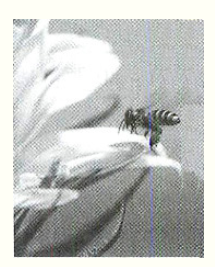有一年夏天的下午,我在山上一连割了几小时柴草,最后决定坐下来吃点东西。我坐在一根圆木上,拿出一块儿三明治,一边吃一边眺望那美丽的山野和清澈的湖水。 (76) ,我的闲暇心情是不会被打扰的。那是一只普普通通的、却能使用餐者感到厌烦的蜜蜂。不用说,我立刻将它赶走了。蜜蜂一点儿也没有被吓住, (77) 。这下我可失去了耐心。我一下将它拍打在地,随后一脚踩入沙土里。没过多久,那一堆沙土鼓了起来。我不由得吃了一惊,这个受到我报复的小东西顽强地抖着翅膀出现了。我毫不犹豫地站立起来,又一次把它踩入沙土中。

我再一次坐下来用餐。几分钟以后, (78) 。一只受了伤但还没有死去的蜜蜂艰难地从沙土里钻了出来。重新出现的蜜蜂使我感到很内疚。 (79) :它右翅还比较完整,但左翅却皱折得像一团纸。可它仍然慢慢地一上一下抖动着翅膀,仿佛在估量自己的伤势。它也开始梳理那沾满沙土的胸部和腹部。这只蜜蜂很快把挣扎的力量集中在皱折的左翅上。它伸出腿来,飞快地捋着翅膀, (80) ,似乎在估量自己的飞翔能力。哦,这可怜的小东西以为自己还能飞得起来。
A.要不是一只围着我嗡嗡转的蜜蜂
B.我发现脚边的那堆沙土又动了起来
C.每捋一次,它就拍打几下翅膀
D.它很快飞了回来,又围着我嗡嗡直叫
E.我弯下身去察看它的伤势
那是一只普普通通的、却能使用餐者感到厌烦的蜜蜂。不用说,我立刻将它赶走了。蜜蜂一点儿也没有被吓住()。
参考答案:D
